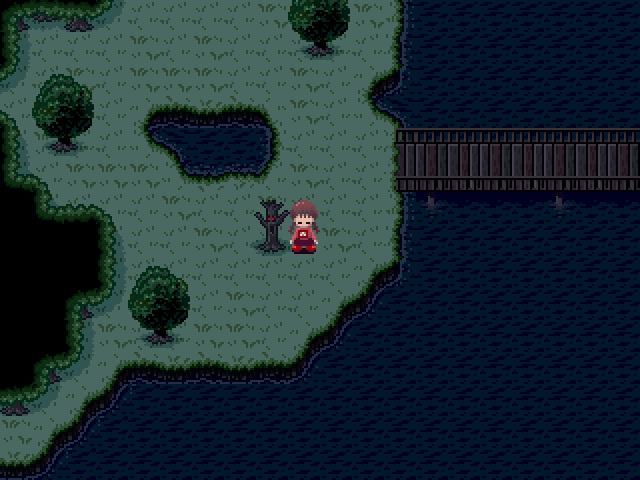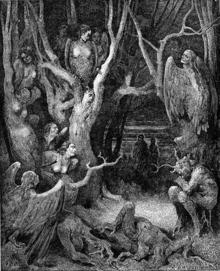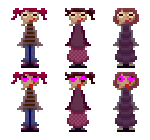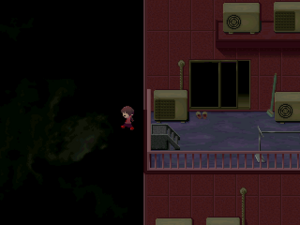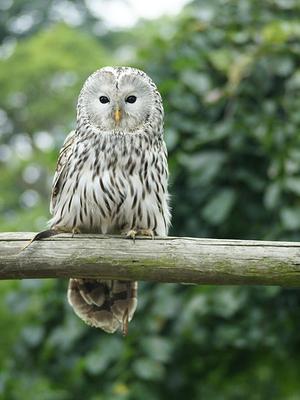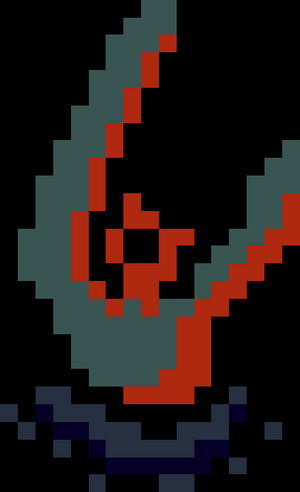>Mt.kiki (Created page with " thumb|left|640px|Witch's Island(The Wood of the Self-Murderers) ==The Dense Woods ([[List_of_Characters#.28Unnamed.29_5|...") |
>Mt.kiki No edit summary |
||
| Line 1: | Line 1: | ||
[[File:kimajo.jpg|thumb|left|640px|Witch's Island(The Wood of the Self-Murderers)]] | [[File:kimajo.jpg|thumb|left|640px|Witch's Island(The Wood of the Self-Murderers)]] | ||
| Line 33: | Line 35: | ||
==[[The Dense Woods]] ([[List_of_Characters#.28Unnamed.29_5|Kimajo]])== | ==[[The Dense Woods]] ([[List_of_Characters#.28Unnamed.29_5|Kimajo]])== | ||
Harpies remained vivid in the Middle Ages. | Harpies remained vivid in the Middle Ages. | ||
[[File:Kimajo_ch.jpg|thumb|Kimajo]] | |||
In his Inferno, XIII, [http://en.wikipedia.org/wiki/Dante <u>Dante</u>] envisages the tortured wood infested with harpies, where the [http://en.wikipedia.org/wiki/Suicide <u>suicides</u>] have their punishment in the seventh ring of Hell:[[File:487px-DVinfernoForestOfSuicides_m.jpg|thumb|right|220px|Harpies in the Forest of Suicides, an 1861 engraving by Gustave Doré, illustrates the same canto of the Inferno.]] | In his Inferno, XIII, [http://en.wikipedia.org/wiki/Dante <u>Dante</u>] envisages the tortured wood infested with harpies, where the [http://en.wikipedia.org/wiki/Suicide <u>suicides</u>] have their punishment in the seventh ring of Hell:[[File:487px-DVinfernoForestOfSuicides_m.jpg|thumb|right|220px|Harpies in the Forest of Suicides, an 1861 engraving by Gustave Doré, illustrates the same canto of the Inferno.]] | ||
| Line 49: | Line 53: | ||
Clawed feet and swollen, feathered bellies; they caw<br />Their lamentations in the eerie trees.<sup class="reference" id="cite_ref-6" sizcache09779979311431767="68 141 69" sizset="false">[http://en.wikipedia.org/wiki/Harpy#cite_note-6 <u>[6</u>]]</sup> | Clawed feet and swollen, feathered bellies; they caw<br />Their lamentations in the eerie trees.<sup class="reference" id="cite_ref-6" sizcache09779979311431767="68 141 69" sizset="false">[http://en.wikipedia.org/wiki/Harpy#cite_note-6 <u>[6</u>]]</sup> | ||
| Line 56: | Line 61: | ||
==[[Toriningen]] ([http://en.wikipedia.org/wiki/Harpy Harpy])== | |||
[[File:Toriningen_all_anim_lunatic.gif|thumb|Harpy three sister?]] | In [http://en.wikipedia.org/wiki/Greek_mythology <u>Greek mythology</u>], a harpy ([http://en.wikipedia.org/wiki/Greek_language <u>Greek</u>]: ἅρπυια, harpyia, pronounced [http://en.wikipedia.org/wiki/Help:IPA_for_Greek <u>[hárpuja</u>]]; [http://en.wikipedia.org/wiki/Latin_language <u>Latin</u>]: harpeia) was one of the winged spirits best known for constantly stealing all food from [http://en.wikipedia.org/wiki/Phineus <u>Phineus</u>]. [[File:Toriningen_all_anim_lunatic.gif|thumb|Harpy three sister?]] | ||
The literal meaning of the word seems to be "that which snatches" as it comes from the Greek word harpazein (ἁρπάζειν), which means "to snatch". | |||
[[File:The_Jump.png|thumb|The Ending(madotsuki)]] | [[File:The_Jump.png|thumb|left|The Ending(madotsuki)]] | ||
※Relevance with "[http://en.wikipedia.org/wiki/The_Wood_of_the_Self-Murderers:_The_Harpies_and_the_Suicides <u>The Wood of the Self-Murderers: The Harpies and the Suicides</u>]" ,[[Toriningen]] ([http://en.wikipedia.org/wiki/Harpy Harpy]) and the [[Madotsuki]](The Suicides) | |||
http://yumenikki.wikia.com/wiki/The_Dense_Woods(name)#The_Dense_Woods.28Kimajo.29 | |||
| Line 93: | Line 99: | ||
ローマ神話においてエウロスに相当する神格はウルトゥルヌス (Vulturnus) であった。 | ローマ神話においてエウロスに相当する神格はウルトゥルヌス (Vulturnus) であった。 | ||
==[[Witch's Island]]([http://en.wikipedia.org/wiki/Witch-hunt Witch-hunt])== | ==[[Witch's Island]]([http://en.wikipedia.org/wiki/Witch-hunt Witch-hunt])== | ||
| Line 105: | Line 113: | ||
For example, the relation of monster [http://ja.wikipedia.org/w/index.php?title=%E3%82%B9%E3%83%88%E3%83%AA%E3%82%AF%E3%82%B9&action=edit&redlink=1 <u>ストリクス</u>] (it was presupposed that a female figure was carried out, it was changed into an [http://en.wikipedia.org/wiki/Ural_Owl owl], and it flew in the sky) and the witch image which appear in the tradition of the [http://en.wikipedia.org/wiki/Bacchanalia Bacchus] faith which was the race religion of Rome, or Rome is pointed out. | For example, the relation of monster [http://ja.wikipedia.org/w/index.php?title=%E3%82%B9%E3%83%88%E3%83%AA%E3%82%AF%E3%82%B9&action=edit&redlink=1 <u>ストリクス</u>] (it was presupposed that a female figure was carried out, it was changed into an [http://en.wikipedia.org/wiki/Ural_Owl owl], and it flew in the sky) and the witch image which appear in the tradition of the [http://en.wikipedia.org/wiki/Bacchanalia Bacchus] faith which was the race religion of Rome, or Rome is pointed out. | ||
==[[Witch's Island]]([http://en.wikipedia.org/wiki/Ural_Owl Ural Owl])== | ==[[Witch's Island]]([http://en.wikipedia.org/wiki/Ural_Owl Ural Owl])== | ||
| Line 116: | Line 126: | ||
*[http://ja.wikipedia.org/w/index.php?title=%E9%96%8B%E7%9B%AE%E6%8A%84&action=edit&redlink=1 <u>開目抄</u>] 譬へば幼稚の父母をのる、父母これをすつるや。梟鳥が母を食、母これをすてず。破鏡父をがいす、父これにしたがふ。畜生すら猶かくのごとし | *[http://ja.wikipedia.org/w/index.php?title=%E9%96%8B%E7%9B%AE%E6%8A%84&action=edit&redlink=1 <u>開目抄</u>] 譬へば幼稚の父母をのる、父母これをすつるや。梟鳥が母を食、母これをすてず。破鏡父をがいす、父これにしたがふ。畜生すら猶かくのごとし | ||
In Japan and China, since it was thought that a mother was eaten and it grew up "an undutiful bird", 梟 is called.<br />Nichiren is mentioning this point in writing repeatedly [1]. | In Japan and China, since it was thought that a mother was eaten and it grew up "an undutiful bird", 梟 is called.<br />Nichiren is mentioning this point in writing repeatedly [1]. | ||
==[[Witch's Island]]([http://en.wiktionary.org/wiki/sink_or_swim Sink or Swim])== | ==[[Witch's Island]]([http://en.wiktionary.org/wiki/sink_or_swim Sink or Swim])== | ||
Revision as of 07:43, 3 June 2013
The Dense Woods (Kimajo)
Harpies remained vivid in the Middle Ages.
In his Inferno, XIII, Dante envisages the tortured wood infested with harpies, where the suicides have their punishment in the seventh ring of Hell:
http://en.wikipedia.org/wiki/Harpy
Here the repellent harpies make their nests,
Who drove the Trojans from the Strophades
With dire announcements of the coming woe.
They have broad wings, a human neck and face,
Clawed feet and swollen, feathered bellies; they caw
Their lamentations in the eerie trees.[6]
William Blake was inspired by Dante's description in his pencil, ink and watercolour "The Wood of the Self-Murderers: The Harpies and the Suicides" (Tate Gallery, London)
Toriningen (Harpy)
In Greek mythology, a harpy (Greek: ἅρπυια, harpyia, pronounced [hárpuja]; Latin: harpeia) was one of the winged spirits best known for constantly stealing all food from Phineus.
The literal meaning of the word seems to be "that which snatches" as it comes from the Greek word harpazein (ἁρπάζειν), which means "to snatch".
※Relevance with "The Wood of the Self-Murderers: The Harpies and the Suicides" ,Toriningen (Harpy) and the Madotsuki(The Suicides)
http://yumenikki.wikia.com/wiki/The_Dense_Woods(name)#The_Dense_Woods.28Kimajo.29
Witch's Island(Anemoi)
※Dress and hair which hang over the wind from "the East(Anemoi?)".
Added by pumoo milk
http://www.youtube.com/watch?v=d96T6J38Dhc
Eurus (Greek: Εύρος, Eúros) was the Greek deity representing the unlucky east wind. He was thought to bring warmth and rain, and his symbol was an inverted vase, spilling water. His Roman counterpart was Vulturnus (not to be confused with Volturnus, a tribal river-god who later became a Roman deity of the River Tiber).
エウロス(Εύρος, Euros)は、不吉な東風を表す神である。エウロスは暖気と雨を運んでくる神と考えられており、さかさまになって水をこぼしている壺がエウロスの象徴であった。
ローマ神話においてエウロスに相当する神格はウルトゥルヌス (Vulturnus) であった。
Witch's Island(Witch-hunt)
※The nose at Which(Witch-hunt?) the White-skin witch was displeased is "a beak(Ural Owl?)"
1 ヨーロッパにおける魔女狩り 女性研究家マックス・ダシュー(Max Dashu)によれば、中世の人々が持っていた魔女観はキリスト教以前の社会にさかのぼるものも見られるという。たとえばローマの民族宗教であったバッカス信仰やローマの伝説に出る怪物ストリクス(女性の姿をし、ふくろうに化けて空を飛ぶとされた)と魔女像との関係が指摘されている。
For example, the relation of monster ストリクス (it was presupposed that a female figure was carried out, it was changed into an owl, and it flew in the sky) and the witch image which appear in the tradition of the Bacchus faith which was the race religion of Rome, or Rome is pointed out.
Witch's Island(Ural Owl)
※Madotsuki havn't her mother, If it passed away in a certain accident and childbirth?
http://yumenikki.wikia.com/wiki/Hell(name)#Hell.28Caesarean_section.29
日本と中国では、梟は母親を食べて成長すると考えられていた為「不孝鳥」と呼ばれる。日蓮は著作に於いて何度もこの点を挙げている[1]。
- 開目抄 譬へば幼稚の父母をのる、父母これをすつるや。梟鳥が母を食、母これをすてず。破鏡父をがいす、父これにしたがふ。畜生すら猶かくのごとし
In Japan and China, since it was thought that a mother was eaten and it grew up "an undutiful bird", 梟 is called.
Nichiren is mentioning this point in writing repeatedly [1].
Witch's Island(Sink or Swim)
Etymology
Possibly from the practice of throwing a suspected witch into water.

